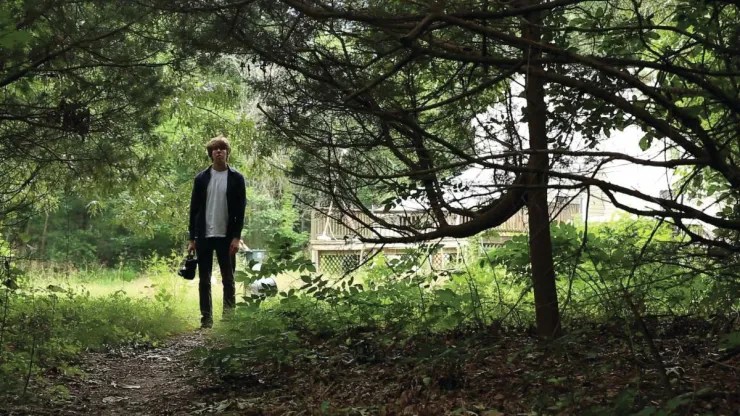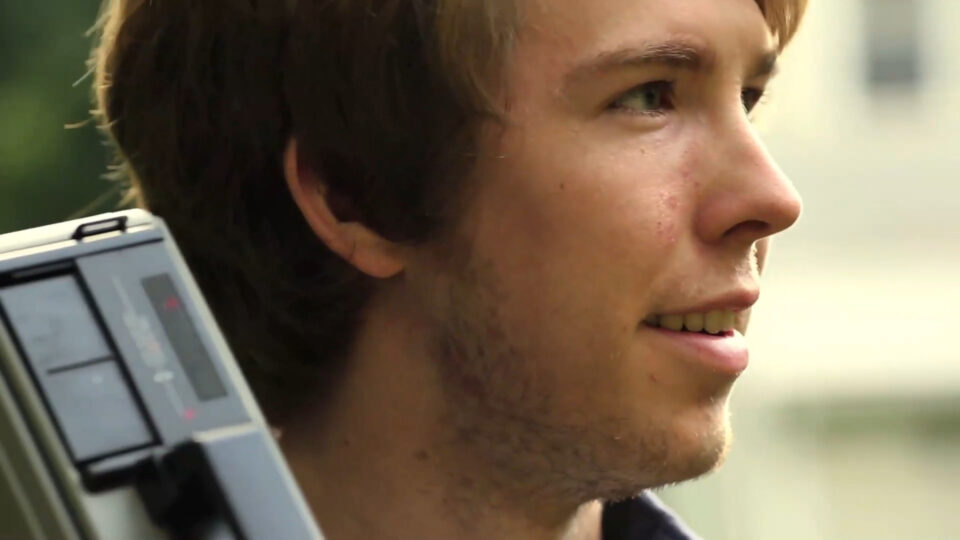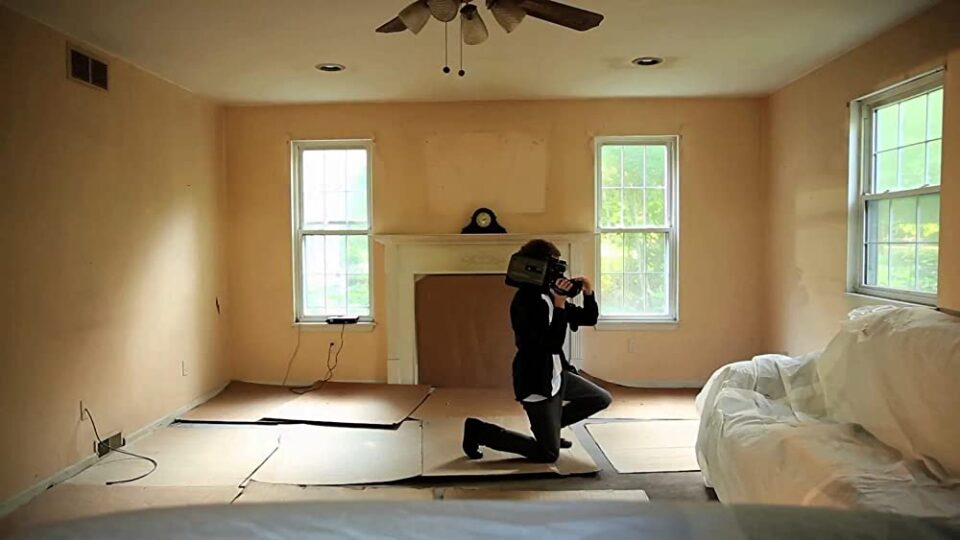Life, Death, and The Power Of Memory In ‘LandLocked’

“I really had a good time with all you guys. We had a great thing going here一and made my life great.” These dying words open Paul Owens‘ film LandLocked. A montage of home video footage plays and sets the tone for a surprisingly poignant story about life, death, and memories. Owens’ LandLocked mines the passing of time and how one’s grief is a lonesome experience. When a young man named Mason (played by Owens’ brother Mason Owens) visits his childhood home before it’s demolished, he must confront his father’s death and grieve the destruction of memories, leading him to wander through the past like a phantom.
Mason arrives at the secluded home to find it in shambles. Bushes and grass are overgrown, and slimy green algae clings to the house’s exterior. It’s certainly seen better days, and there’s a heaviness surrounding the property as he approaches. You begin to feel the urgency and what an important moment it truly is for Mason. Once inside, he rummages through boxes and old photographs, looking for anything he’d like to keep.
Each room appears haunted, as though those from the past still inhabit the home. Mason eventually stumbles upon boxes of VHS tapes and a bulky video recorder and decides to try it out. When he’s walking the grounds towards the old watering hole out back, he raises the camera and peers back in time. Voices of him and his brothers Seth and Paul echo from the past. Mason is initially confused but relishes in the moment. His face breaks out into an intoxicated grin.

When I visited my own childhood home, it was already demolished. All that remains now is the chimney and chipped foundation. The yard has been leveled out, and nothing about the property looks the same. Chestnut trees still dot the backyard, where I poured my late sister’s ashes, and the grass is as lush and vibrant as ever. It’s only slightly overgrown, and it appears someone is still tending to the grounds.
Even without a structure, I can still feel the ghosts of the past walking around, unable to move on or let go. I’ve been up to the homestead a handful of times over the years, and it never gets any easier to process. I find myself aimlessly sprinting through the past, trying to keep a firm grasp on every small detail. But it’s an impossible task. It’s rather like sand in an hourglass. The brain only holds onto so many memories before they slip through time, never to be remembered again.
Mason’s journey is much the same. While we see only glimpses into his past, it’s clear Mason holds his childhood dear. And he’s far from letting it go. He meanders through the house, and Owens lets the audience simply stew along with him. You get to really exist in the space and feel the home’s energies. The walls pulsate with a life richly lived, each crack in the walls representing time’s fleeting nature. “Tick, tick, tock,” they seem to chant.
Paul and Seth make an appearance to collect belongings and other trinkets to remember their past. It’s these sobering reunions that strike like a hot iron on skin. When Seth comes to haul away a vintage Chevrolet, Mason asks about the day he found his father lying on the floor. But Seth doesn’t want to talk about that. Instead, he lets that memory fester and bubble under his skin. In a conversation with Paul, Mason reflects, “It’s weird dad not being here.”

Jeffrey’s presence hangs like a shroud over the film. Such is the way of memories. They haunt and torment you until you either wallow in them or untether yourself. Mason falls prey to his own mind and his desperation to cling to his childhood. He quickly becomes obsessed with the VHS tapes and begins filming in several different locations in and around the house. He replays countless memories—including one cheery Christmas, being fed as a baby, and gathering around the TV set to watch a sports game. It all washes over him and feeds him to keep going. He compiles memories on VHS tapes and labels and dates every single one. He’s not grieving a house but what the house’s demolition symbolizes: the death of memory itself.
It’s all ephemeral. The present is here one moment and gone the next, like a polaroid flash in the mind. To drive this point home, Paul Owens sprinkles in shots of wasps and a wasp nest. On the surface, it might be trivial or random, but it speaks to the very nature of human existence. A wasp’s lifespan is a mere 12 to 22 days. They’re born; they live; and then suffer a glorious death. It all happens so fast. I can remember building snow forts in my front yard like it was yesterday. Those days are like wasps. They happen, and then they vanish. Just like that.
Mason’s days are numbered, too. He becomes so tangled in memories he begins seeing himself in the recent past in the house. In one particular moment, he watches himself watching memories. He’s taken aback at first but soon leans into the experience. He gets a high from reliving his childhood, filling a void in his soul.
As he peers through time, a blackened, charred creature emerges from the shadows. It gives off smoke and slogs along looking for a VHS tape. It circles around the room before stepping out of frame and disappearing as though it’d never been there to begin with. Then, it appears again a little later when Mason awakens from a restless slumber. Because he doesn’t have the camera in tow, he can’t see the creature standing two feet from his face. While there’s no concrete explanation for the creature, a little digging might suggest it’s a version of Mason after he’s spent far too much time in the past. And now, he’s a literal smoking shell of his former self.

Eventually, he comes to witness his father’s collapse and how his brother Seth watched over him. It’s a startling scene that brings Mason’s mental state into clearer focus. He finds the revelation too much, so he drags his camera out to the backyard and buries it in the dirt. He wants so desperately to turn back, but the past won’t let him. A few moments later, it’s shown that the camera has been dug up. This sends him careening out of control. So, he begins following the sounds of voices through the air vent, into and out of the dirt, and back into the house.
Audio from his many VHS tapes plays with profound clarity. He is now literally writhing in memories, and he can’t stop what’s coming next. He finds his way into the very room in which his father recorded his goodbye. His father has a wide grin and gazes into the TV’s mesmerizing glow, as he views the very first tape he ever recorded一dated June 5, 1991 (the day Mason was brought home from the hospital).
It’s all a surreal experience, as much for the viewer as it is for Mason. The past comes for him, and he allowed it to happen. With his final words (“Dad, I think they’re tearing down the house”), the roof comes crashing down upon their heads. Dust and debris send the memories into oblivion. What are we really in the end but ghosts of the past? Mason is now a ghost, forever wandering the earth in the hopes of regaining something lost in his youth. He may never find it, but that’s just human existence. None of us will ever find it, and therein lies true sorrow.
LandLocked posits that replaying the past over and over again is harmful to the spirit. It’s one thing to cherish memories and collect photographs and belongings, but it’s another to become so consumed by the past you forget to live in the present. As I’ve grown older, I’ve certainly fallen victim to reflecting upon and becoming obsessed with looking back. Every few months, I flip through a photo album or dig through my Beverly Hills 90210 chest. It’s almost a compulsion, and I fully realize now that I’ve been teetering on that same ledge as Mason. His story is undeniably a tragic one, a cautionary tale about what it means to die by the past. We could learn so much from the story Paul Owens has crafted. Perhaps more than anything, we may even learn to live again.
Categorized: Editorials News
